
The common ground dove is a small bird that inhabits the southern United States, parts of Central America, the Caribbean and northern South America. It is considered to be the smallest dove that inhabits the United States. As its name suggests, the bird spends the majority of its time on the ground walking but still has the ability to fly.

Paectes is a genus of moths of the family Euteliidae erected by Jacob Hübner in 1818.

Haminoea is a genus of medium-sized sea snails or bubble snails, marine opisthobranch gastropod molluscs in the family Haminoeidae, the haminoea bubble snails, part of the clade Cephalaspidea, the headshield slugs and bubble snails.
Ethmia confusella is a moth in the family Depressariidae. It is found from the Florida Keys and Bahamas, through the Greater Antilles to the Yucatan Peninsula, and through the Lesser Antilles to Trinidad.

Paectes obrotunda is a moth of the family Euteliidae first described by Achille Guenée in 1852. It is found in Brazil. The species is only known from the female holotype. Formerly, the species was recorded from Southern North America through Central America to South America. It is also found on the Greater Antilles and Lesser Antilles. These records were based on misidentifications.

Paectes arcigera is a moth in the family Euteliidae first described by Achille Guenée in 1852. It is restricted to the eastern Caribbean Islands, ranging from Puerto Rico to the Lesser Antilles.
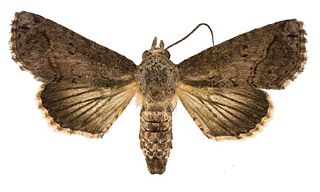
Paectes longiformis is a moth in the family Euteliidae first described by Michael G. Pogue in 2012. It is found in the north-eastern Brazilian state of Bahia.

Paectes similis is a moth in the family Euteliidae first described by Michael G. Pogue in 2013. It is found in the north-eastern Brazilian state of Pernambuco.
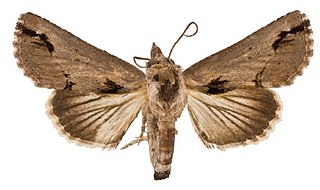
Paectes nana is a moth in the family Euteliidae. It is widespread from Florida through the Greater Antilles and from Mexico to Costa Rica. In South America, it is found in Venezuela, Colombia and northern Ecuador. It has been introduced to the Galapagos Islands.
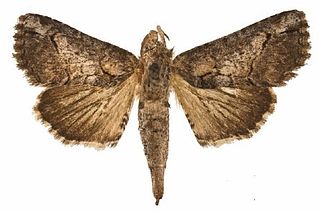
Paectes medialba is a moth in the family Euteliidae first described by Michael G. Pogue in 2013. It is found in north-western Argentina.
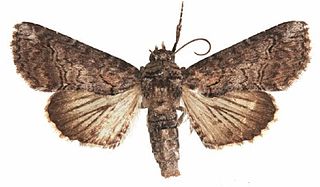
Paectes sinuosa is a moth in the family Euteliidae first described by Michael G. Pogue in 2013. It is found in the Brazilian states of Goiás and São Paulo, north-western Paraguay and the Argentine province of Tucumán.

Paectes tumida is a moth in the family Euteliidae first described by Michael G. Pogue in 2013. It is found in Colombia (Villavicencio), Guyana, Suriname and French Guiana.
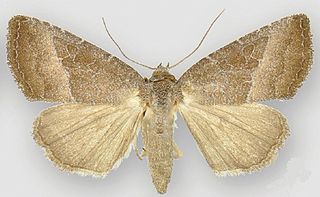
Ogdoconta cinereola, the common pinkband moth, is a moth in the family Noctuidae. It is found in eastern, central, and south-western North America. It occurs from southern Ontario and Quebec south to southern Florida. At the western edge of its distribution, it occurs from Manitoba southward through the Great Plains of Nebraska and Iowa, south throughout most of Texas, and westward through southern New Mexico to south-eastern Arizona. The distribution extends south to the state of Coahuila in northern Mexico.

Ogdoconta moreno is a moth in the family Noctuidae first described by William Barnes in 1907. It is only known from southern Arizona in the US, although its distribution likely extends into Mexico.

Ogdoconta satana is a moth in the family Noctuidae. It is found in western Texas and Carlsbad Caverns National Park in Eddy County, New Mexico. It is probably also present in Mexico.
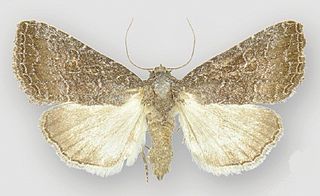
Ogdoconta tacna is a moth in the family Noctuidae first described by William Barnes in 1904. It is found in the US in central and south-eastern Texas. It is probably also present in Mexico.
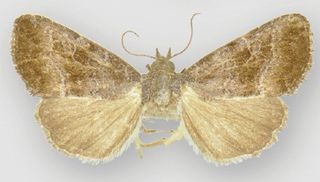
Ogdoconta fergusoni is a moth in the family Noctuidae. It is found in Florida, southern Mississippi and southern Louisiana.

Disphragis notabilis is a moth of the family Notodontidae first described by William Schaus in 1906. It is found throughout the Amazon basin from western Venezuela east- and southward to at least Bolivia. The range includes French Guiana.
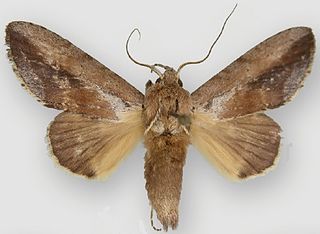
Disphragis bifurcata is a moth in the family Notodontidae first described by J. Bolling Sullivan and Michael G. Pogue in 2014. It is found from Guatemala to Colombia, probably extending south into northern Ecuador. It is found at lower altitudes and moderate elevations up to about 1,000 meters.
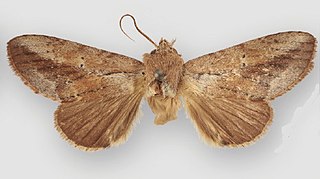
Disphragis hemicera is a moth in the family Notodontidae first described by William Schaus in 1910. It is found throughout Costa Rica at moderate altitudes. It is found south along the western coast of Colombia and may extend to the west coast of Ecuador. The northern limits are unknown but it probably occurs at least into Nicaragua.



















